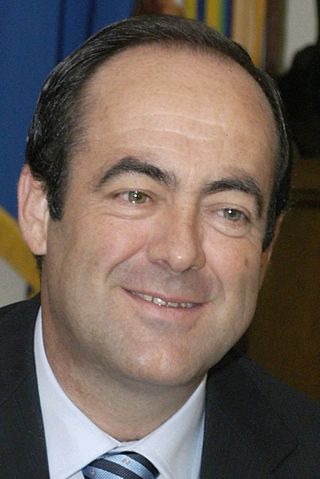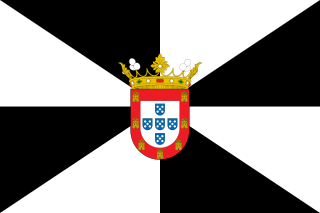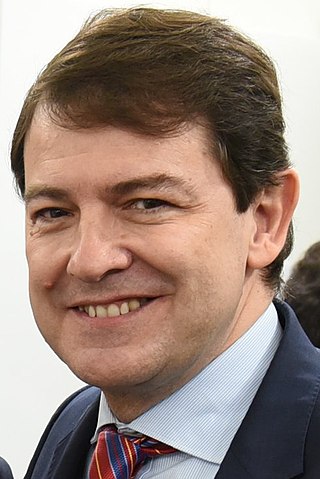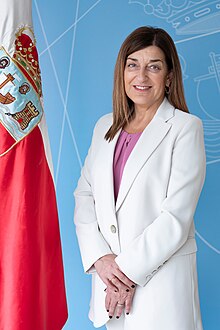
The politics of Spain takes place under the framework established by the Constitution of 1978. Spain is established as a social and democratic sovereign country wherein the national sovereignty is vested in the people, from which the powers of the state emanate.

The Spanish Constitution is the supreme law of the Kingdom of Spain. It was enacted after its approval in a constitutional referendum; it represents the culmination of the Spanish transition to democracy. It is a written constitution.

The 2011 Riojan regional election was held on Sunday, 22 May 2011, to elect the 8th Parliament of the autonomous community of La Rioja. All 33 seats in the Parliament were up for election. The election was held simultaneously with regional elections in twelve other autonomous communities and local elections all throughout Spain.

The 2011 Cantabrian regional election was held on Sunday, 22 May 2011, to elect the 8th Parliament of the autonomous community of Cantabria. All 39 seats in the Parliament were up for election. The election was held simultaneously with regional elections in 12 other autonomous communities and local elections all throughout Spain.

The 2015 Cantabrian regional election was held on Sunday, 24 May 2015, to elect the 9th Parliament of the autonomous community of Cantabria. All 35 seats in the Parliament were up for election. The election was held simultaneously with regional elections in 12 other autonomous communities and local elections all throughout Spain.

The 1987 Cantabrian regional election was held on Wednesday, 10 June 1987, to elect the 2nd Regional Assembly of the autonomous community of Cantabria. All 39 seats in the Regional Assembly were up for election. The election was held simultaneously with regional elections in 12 other autonomous communities and local elections all throughout Spain, as well as the 1987 European Parliament election.

The 1991 Cantabrian regional election was held on Sunday, 26 May 1991, to elect the 3rd Regional Assembly of the autonomous community of Cantabria. All 39 seats in the Regional Assembly were up for election. The election was held simultaneously with regional elections in 12 other autonomous communities and local elections all throughout Spain.

The 1995 Cantabrian regional election was held on Sunday, 28 May 1995, to elect the 4th Regional Assembly of the autonomous community of Cantabria. All 39 seats in the Regional Assembly were up for election. The election was held simultaneously with regional elections in 12 other autonomous communities and local elections all throughout Spain.

The 1999 Cantabrian regional election was held on Sunday, 13 June 1999, to elect the 5th Parliament of the autonomous community of Cantabria. All 39 seats in the Parliament were up for election. The election was held simultaneously with regional elections in 12 other autonomous communities and local elections all throughout Spain, as well as the 1999 European Parliament election.

The 2003 Cantabrian regional election was held on Sunday, 25 May 2003, to elect the 6th Parliament of the autonomous community of Cantabria. All 39 seats in the Parliament were up for election. The election was held simultaneously with regional elections in 12 other autonomous communities and local elections all throughout Spain.

The 2007 Cantabrian regional election was held on Sunday, 27 May 2007, to elect the 7th Parliament of the autonomous community of Cantabria. All 39 seats in the Parliament were up for election. The election was held simultaneously with regional elections in 12 other autonomous communities and local elections all throughout Spain.

The 1999 Extremaduran regional election was held on Sunday, 13 June 1999, to elect the 5th Assembly of the autonomous community of Extremadura. All 65 seats in the Assembly were up for election. The election was held simultaneously with regional elections in twelve other autonomous communities and local elections all throughout Spain, as well as the 1999 European Parliament election.

The 1999 Castilian-Manchegan regional election was held on Sunday, 13 June 1999, to elect the 5th Cortes of the autonomous community of Castilla–La Mancha. All 47 seats in the Cortes were up for election. The election was held simultaneously with regional elections in twelve other autonomous communities and local elections all throughout Spain, as well as the 1999 European Parliament election.

The 1999 Riojan regional election was held on Sunday, 13 June 1999, to elect the 5th Parliament of the autonomous community of La Rioja. All 33 seats in the Parliament were up for election. The election was held simultaneously with regional elections in twelve other autonomous communities and local elections all throughout Spain, as well as the 1999 European Parliament election.

The 2003 Rioja regional election was held on Sunday, 25 May 2003, to elect the 6th Parliament of the autonomous community of La Rioja. All 33 seats in the Parliament were up for election. The election was held simultaneously with regional elections in twelve other autonomous communities and local elections all throughout Spain.

The 2007 Riojan regional election was held on Sunday, 27 May 2007, to elect the 7th Parliament of the autonomous community of La Rioja. All 33 seats in the Parliament were up for election. The election was held simultaneously with regional elections in twelve other autonomous communities and local elections all throughout Spain.

The Mayor-President of the Autonomous City of Ceuta or simply the President of Ceuta, is the highest political position of the Autonomous City of Ceuta. Due to the special status of the Spanish autonomous cities, the president is also the mayor of the city, and as such the mayor-president acts as the head of government and as the presiding officer of the Assembly of Ceuta, the legislative branch of the city.

The 2019 Cantabrian regional election was held on Sunday, 26 May 2019, to elect the 10th Parliament of the autonomous community of Cantabria. All 35 seats in the Parliament were up for election. The election was held simultaneously with regional elections in eleven other autonomous communities and local elections all throughout Spain, as well as the 2019 European Parliament election.

The next Castilian-Leonese regional election will be held no later than Saturday, 21 March 2026, to elect the 12th Cortes of the autonomous community of Castile and León. All 81 seats in the Cortes will be up for election. The electoral calendar of Castile and León was altered as a result of the 2022 snap election, meaning the election will be held in a date different from that of the regularly scheduled May regional and elections in 2023.

The next Cantabrian regional election will be held no later than Sunday, 23 May 2027, to elect the 12th Parliament of the autonomous community of Cantabria. All 35 seats in the Parliament will be up for election.




























